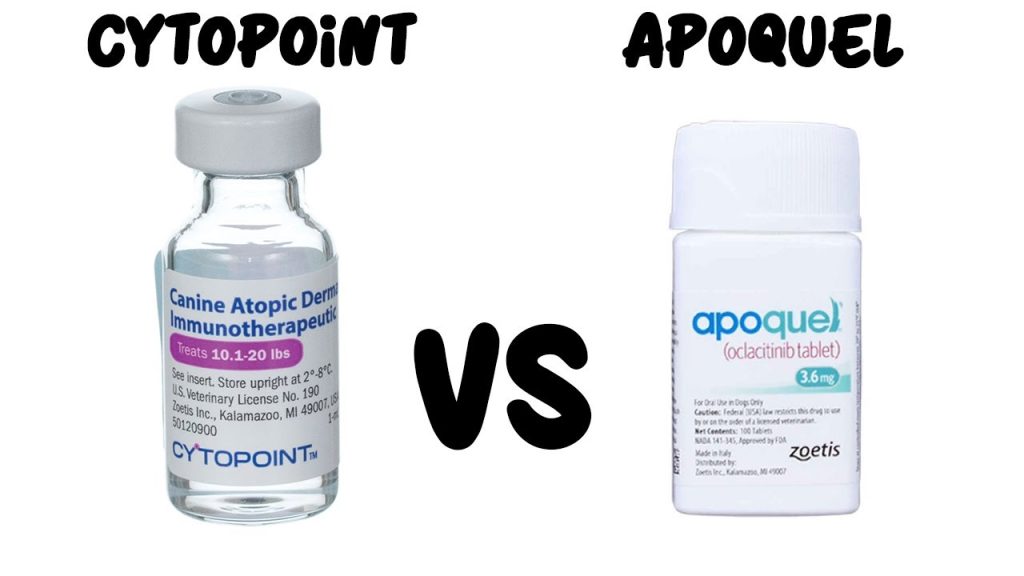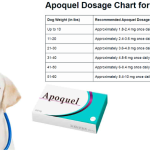When tending to your cherished canine companion’s allergies, it’s only natural for a flood of questions to surface. Apoquel and Cytopoint emerge as beacons of hope in the vast sea of treatments, offering effective relief. To ensure you’re well-equipped to make the right choices and provide the utmost care for your furry family member, we’ve gathered the most commonly asked questions about these two allergy management heroes.

Common Queries About Apoquel:
- Positive Points:
- Effectiveness: Apoquel is known for its quick and effective relief from dog itching and inflammation.
- Convenience: It comes in tablet form, making it easy for pet owners to administer.
- Rapid Action: Many users report seeing improvement in their dog’s symptoms within 24 hours, providing fast relief.
- Negative Points:
- Side Effects: Some dogs may experience vomiting, diarrhea, or loss of appetite, usually mild and temporary.
- Long-Term Use Concerns: There are potential long-term health risks associated with prolonged use.
- Prescription Required: Apoquel is a prescription medication requiring a vet’s authorization.
- Neutral Points:
- Cost: The price of Apoquel can be a factor for some pet owners. However, its effectiveness may justify the cost.
- Not a Cure: While Apoquel relieves symptoms, it is not a cure for underlying conditions.
Common Queries About Cytopoint:
1. Positive Points:
- Targeted Approach: This is designed to target and neutralize the proteins causing itching in dogs.
- Long-Lasting Relief: A single injection can relieve for 4-8 weeks.
- Minimal Side Effects: Cytopoint generally has fewer side effects than traditional medications.
2. Negative Points:
- Cost: The initial cost of Cytopoint can be higher than some other treatments.
- Delayed Onset: While effective, Cytopoint may take a few days to work, so it may not provide rapid relief.
- Veterinary Administration: Cytopoint requires a vet visit for administration, which can be inconvenient for pet owners.
3. Neutral Points:
- Prescription Required: Like Apoquel, Cytopoint is a prescription medication, necessitating a vet’s approval.
- Not a Cure: While it manages symptoms effectively, Cytopoint doesn’t treat the root cause of the allergies.
- What are Apoquel and Cytopoint, and what’s their mechanism of action?
Apoquel: Apoquel is your dog’s swift superhero, donning an oral cape. It swoops in, targeting those pesky immune system receptors responsible for the itching and inflammation.
Cytopoint: Cytopoint acts as the long-lasting guardian. It’s like a superhero serum injected to the rescue, armed with monoclonal antibodies that lock onto the notorious itch-inducing culprit, IL-31. Once administered, it grants your furry friend relief that can stretch for a remarkable 4 to 8 weeks. Yes, you read that right—weeks!
- Are Apoquel and Cytopoint safe for my dog?
While both Apoquel and Cytopoint are typically considered safe under the watchful eye of a veterinarian, it’s crucial to remember that even in medicine, there’s no such thing as a risk-free guarantee. It is essential to have a heart-to-heart with your veterinarian about your furry friend’s unique health journey and any possible side effects that may pop up along the way.
- Can I use Apoquel and Cytopoint together?
Absolutely! Sometimes, veterinarians play the role of a masterful conductor in an orchestra, blending the melodies of Apoquel and Cytopoint to create a harmonious symphony of relief for our furry friends. It’s like having a versatile toolkit to soothe your dog’s itchiest days, ensuring their well-being and happiness are always center stage. Your veterinarian is the maestro, orchestrating this beautiful performance tailored to your pet’s needs.
- How do I administer Apoquel and Cytopoint?
Apoquel: This little lifesaver comes in the form of a tablet, and your trusty vet will be your guiding star, offering you tailored dosing instructions to ensure your furry friend’s comfort.
Cytopoint: Cytopoint swoops in via an injection at your veterinarian’s office, where your dog gets the VIP treatment. The frequency is adjusted as per your dog’s unique needs.
- What are the potential side effects of Apoquel and Cytopoint?
While Apoquel and Cytopoint are typically gentle on most dogs, it’s important to remember that our furry friends are as unique as their personalities. Just like humans react differently to medications, dogs can too. Apoquel might, on occasion, lead to a bout of tummy trouble with symptoms like vomiting or diarrhea. In contrast, Cytopoint often treads lightly in the side effects department. If you notice anything unusual, a sudden change in behavior, or anything that makes you raise an eyebrow, don’t hesitate to reach out to your trusty veterinarian.
- Are Apoquel and Cytopoint suitable for long-term use?
Apoquel is typically prescribed for both short-term and long-term use, depending on your dog’s needs and the severity of their allergies. Cytopoint is often used for longer-term management, relieving for several weeks with each injection. The best course of action will be decided with the assistance of your veterinarian regarding the duration of your pet.
- Are there alternatives to Apoquel and Cytopoint?
Alternative allergy management options include antihistamines, corticosteroids, and allergen-specific immunotherapy (allergy shots). Discuss these options with your veterinarian to find the best solution for your dog’s condition.
- Can I switch between Apoquel and Cytopoint?
Switching between these treatments may be possible, but it should always be done under the guidance of your veterinarian. They will consider your dog’s individual needs and the timing of the switch to ensure a smooth transition.
- Do I need a prescription for Apoquel and Cytopoint?
Yes, both Apoquel and Cytopoint are prescription medications. Your dog’s health will be assessed by your veterinarian, who will prescribe the most suitable treatment.
- How soon can I anticipate seeing results with Apoquel and Cytopoint?
Apoquel often provides rapid relief, with itching and discomfort typically improving within hours. Cytopoint may take longer but can offer extended relief for several weeks.
Products Reviews:
Review: This Medicine Worked
User: captainmackey

this pill worked wonders for Patches We tried everything for years till our vet gave us this med
Rated: 5/5
Review: Worked first
User: Michelle Young
Frenchie had tried diet modification, allergen rinsing, and every topical application under the sun but to no avail. The vet suggested a cutpoint. The first shot worked within the day to stop aggravated belly rubbing, armpit/back of foreleg scratching and nose rubbing/foot chewing. But unfortunately, red bumps started to show again after 2 weeks. I ran a course of steroids for 10 more days and got a second cytopoint soon after. The second one doesn’t seem to be working as well (but the symptoms are milder overall so maybe just the contrast is not as great). We will continue for now. Injection alone aud177.
Rated: 4.5/5
Conclusion:
Key Points on Apoquel and Cytopoint
- Apoquel inhibits specific enzymes in the immune system, while Cytopoint interrupts the itch cycle by neutralizing the cytokine IL-31.
- Both medications are generally safe for long-term use under veterinary supervision, with the decision dependent on the dog’s health condition.
- Apoquel may cause vomiting, diarrhea, and lethargy, while Cytopoint typically has minimal side effects, with rare reactions at the injection site.
- Veterinarians may prescribe Apoquel and Cytopoint together in some instances for comprehensive relief, but this decision should be made under professional guidance.
- Regular veterinary check-ups are crucial to monitor the dog’s response and potential side effects and adjust the treatment plan.
In conclusion, Apoquel and Cytopoint offer effective solutions for managing allergic skin conditions in dogs, and their appropriate use, combined with veterinary guidance, can significantly improve the quality of life for our furry companions.











